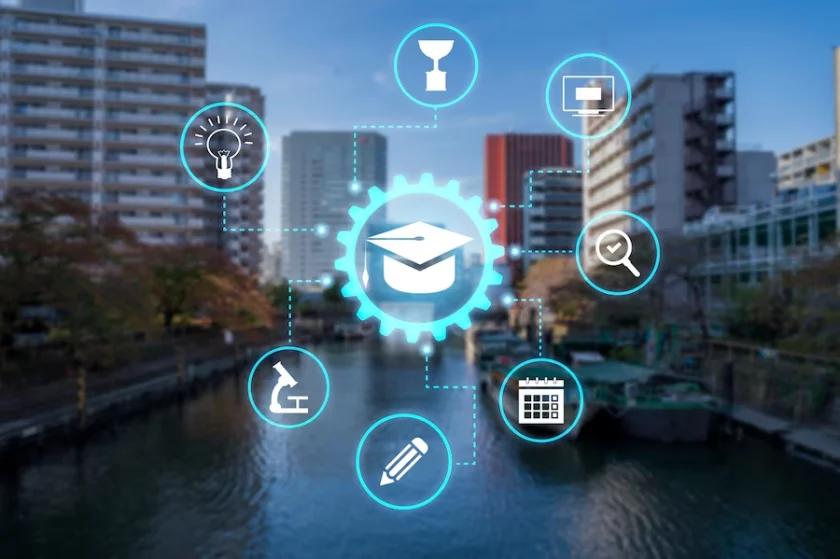We’re quickly moving away from traditional classrooms and textbooks towards a more interactive and connected learning experience. GCSEs (General Certificate of Secondary Education) exams are no exception to this shift. With blended learning becoming increasingly popular, supplemented by digital tools such as online resources and virtual simulations, GCSE students are gaining access to an unprecedented amount of information right at their fingertips. But how does this affect assessment criteria? How will these new technologies affect how GCSEs are taken and evaluated in the future? In this blog post, we’ll explore what changes could be made to help ensure that young students can successfully master a comprehensive range of knowledge while staying ahead of the curve in this ever-evolving digital world.
Exploring the Trend of More Online Teaching in UK Classrooms
The trend of online teaching in UK classrooms has increased in recent years. Schools and teachers have been incorporating technology and online tools into their everyday teaching to enhance the learning experience for students. With the advent of the pandemic, classrooms have taken a huge turn, and online teaching has become necessary.
While some may worry that virtual learning takes away from the traditional classroom experience, using laptops, interactive whiteboards, and online resources has opened up many possibilities. Teachers can tailor their lessons to engage better and challenge their students, while students can enjoy the convenience of learning from the comfort of their own homes.
Online teaching has also given rise to more personalized learning, where each student can receive personalised attention and support.
Advantages and Disadvantages of Virtual Learning
The rise of virtual learning has brought a wave of changes in the education industry.
- The biggest advantage of virtual learning is its flexibility – students can learn at their own pace and schedule.
- Virtual learning saves students from the hassle of commuting which also reduces their carbon footprint.
However, virtual learning also has its fair share of disadvantages.
- Firstly, it requires reliable access to technology and a stable internet connection. Without these, virtual learning wouldn’t be possible.
- Secondly, virtual learning may make it harder for students to stay engaged and ask questions, leading to a less immersive learning experience.
- Finally, despite the drawbacks, virtual learning provides a valuable alternative for those who may not have access to traditional education methods.
How GCSEs Will Evolve in Line with Technological Advancements
As technology advances, it’s clear that education isn’t exempt from its influence. With students now able to complete their studies from the comfort of their homes through online GCSE courses for homeschooling, it begs the question of how traditional GCSEs will evolve to keep up with the times. Will online testing become the norm? Will digital textbooks and resources be integrated into the curriculum? The possibilities are endless.
What’s certain is that as technology evolves, so too must education – and it’ll be fascinating to see how GCSEs adapt to this new landscape.
Strategies for Adapting to Virtual Instruction
As the world shifts towards remote learning, adapting to virtual instruction can be a challenging but rewarding experience with the right strategies. One of the key skills for success is understanding how to submit coursework online efficiently. This requires familiarity with the necessary online platforms and tools and strong organizational skills, and communication with instructors.
While there may be a learning curve, developing a routine for submitting and tracking assignments will help students stay on top of their coursework and avoid falling behind. With patience and persistence, mastering the art of online submissions can lead to improved academic performance and greater confidence in navigating the digital landscape.
Learning Tools and Educational Resources for Students
As remote learning becomes the norm, educational resources and learning tools are becoming increasingly important to help students obtain the support they need. Thanks to modern technology, various resources are available to assist students with online learning, such as virtual classrooms, video conferencing apps, and educational websites that provide free access to educational content.
Online tutoring programs and video lessons also offer personalised assistance for students who need extra help with their studies. These digital tools provide students with flexibility and autonomy as they navigate the challenges of remote learning.
Whether you’re a student in remote learning or a parent supporting your child’s education, utilizing these tools will help ensure academic success no matter where you are.
Assessing the Impact of These Changes on Students’ Academic Progress and Mental Health
As educators, we must constantly evaluate the effect of any changes we make on our students. This is crucial when it comes to academic progress and mental health. With the past year’s events, many schools have had to adapt quickly to new instructional models and technologies.
While these changes have been essential in keeping our students learning and safe, we must ask ourselves: how have they affected our students’ well-being and academic progress? Our responsibility is to closely examine these questions and use the information to guide our decision-making moving forward.
By doing so, we can ensure that our students continue receiving the support they need to thrive academically and emotionally.
Conclusion
The increased use of virtual learning in UK classrooms shows that technological advancements will continue to change the education landscape. Students and educators alike must embrace these changes and become proficient in adapting to virtual instruction. Yet, despite these potential hurdles, a more thorough understanding of the benefits and drawbacks of online teaching offers a pathway to continued success for students in a globalised world.





